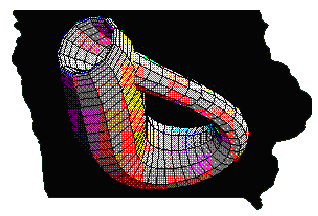 |
Iowa Section of the Mathematical Association of America |
 |
The Iowa Collegiate Mathematics Competition is a three-hour team competition for undergraduate students administered by the Iowa Section of the Mathematics Association of America each year. Specific rules for the competition are listed below.
1. Teams will consist of at most three students. The students on a team will usually be from the same school. However, at the time of the competition, teams of fewer than three students from different schools can combine to make a team of two or three. (The latter should not be used to form "all-star" teams consisting of the best students from two or three schools, but only to allow more students to compete on full teams.)
2. The exam consists of 10 problems. Each team submits one set of solutions to all or some of the problems.
3. Each problem is worth 10 points (for a total of 100 points.) For full credit on a problem the answer must be correct and all supporting work must be shown.
4. No books or notes may be used during the exam. (Exception: non-native speakers may request to be allowed to use a hard copy non-mathematical dictionary.) Calculators (including the TI-92) are allowed. Teams must provide their own paper, pencil, calculators, compasses, rulers, protractors, etc.
5. The school with the winning team in a given year will host the exam the following year. If a team from the host school wins, then the school (other than the host school) with the highest ranking team will host the competition the following year. If a multi-school team wins (see 1.) or places second to the hosting school, then the host for the following year's exam will be the non-hosting school with most members on the team. If there is no such majority then the host for the next year will be determined randomly from among the eligible schools represented on the team.
6. Contest results will be announced several weeks after the contest date. The contest trophy will be presented at the Iowa Section Meeting.